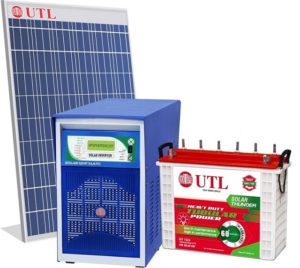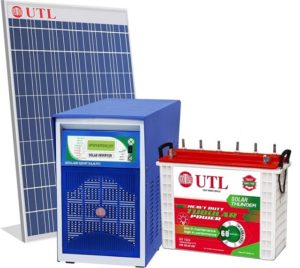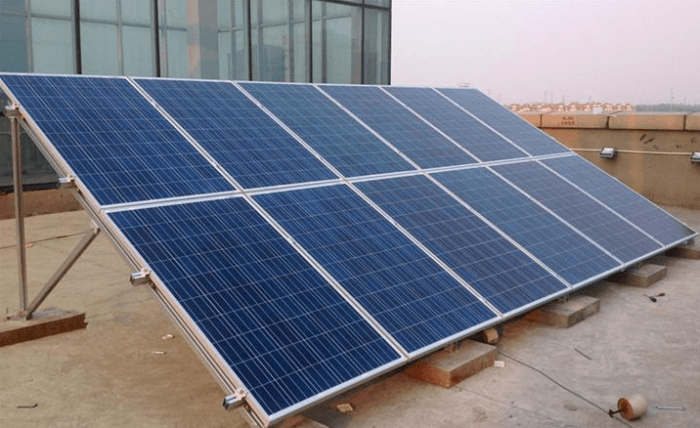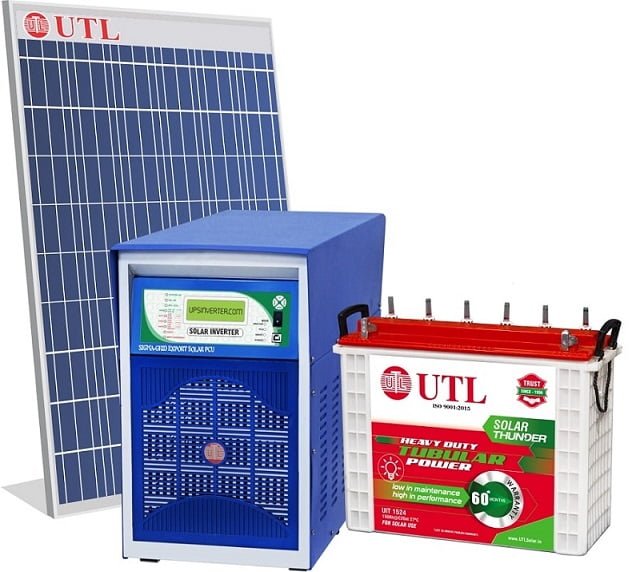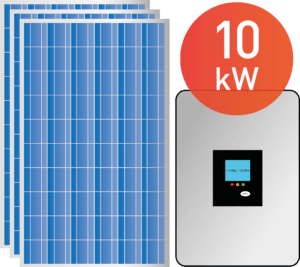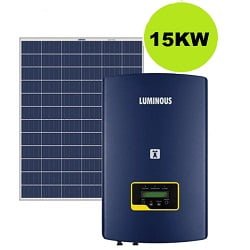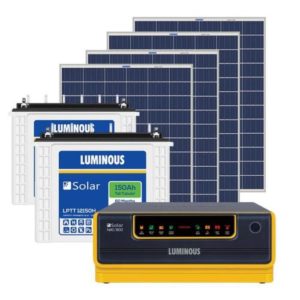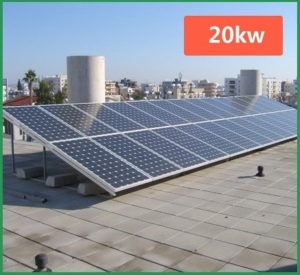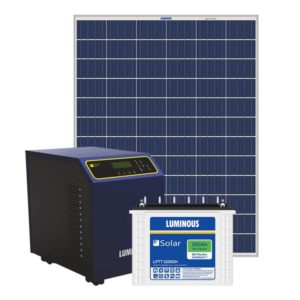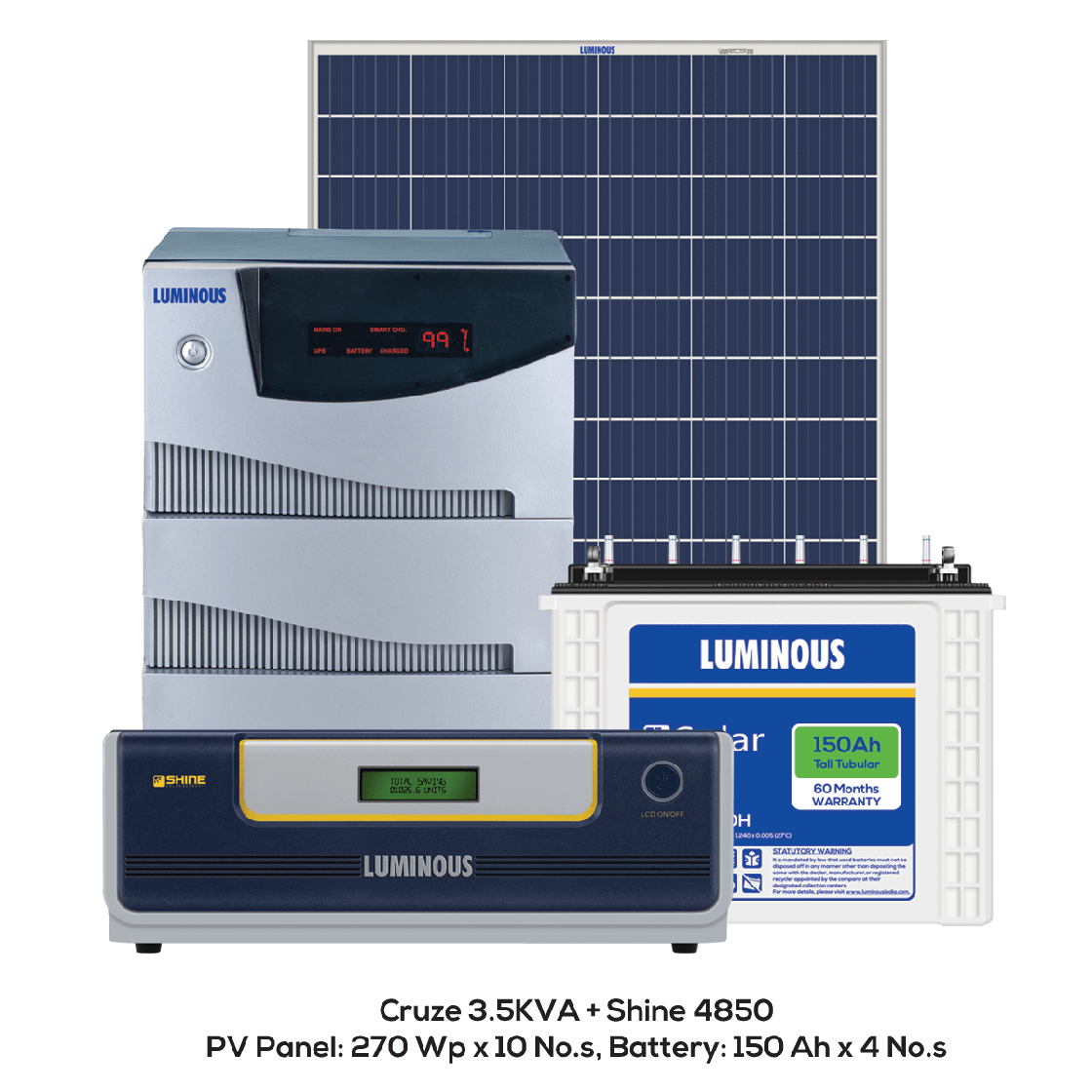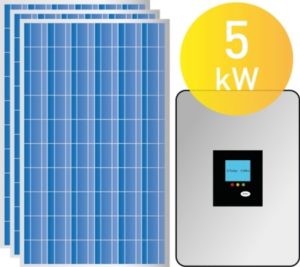Hybrid Solar System – working, price, pros & cons with all details
While choosing a solar system for home, institute, business or industry, people often choose either an on grid solar system or an off grid solar system. But now one more option is available in the market and that is “Hybrid Solar System”. This system is a combination of on grid solar system and off grid solar system. It has battery backup in it to store power and it also have the ability to feed surplus electricity into main grid.
🇮🇳 हिंदी में पढ़े:
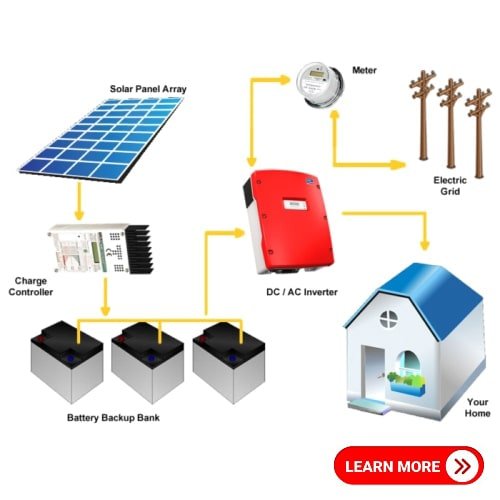
A hybrid solar system will work day and night which means you always have electricity at your home. Hybrid system is a combination of solar energy storage with grid connection. This system provide the flexibility of being able to store the power into batteries that your solar system generated during the day time instead of feeding it back into electricity grid. The same energy can be used in the evening or night instead of buying from government grid at a higher price.
If system is producing more power than is being consumed and your batteries are fully charged, the surplus will be fed to the main electrical grid via solar net metering. At the time of electricity billing, the government or power provider company will adjust the exported units in your electricity bill.
#1. Hybrid Solar System Price
Investing in a hybrid solar system will result in a significant reduction in your electricity bills. The cost of a hybrid system is slightly higher than other types of solar system, but this system gives you uninterrupted power supply as well as more return than its cost over time.
Hybrid PV solar system price range starts from Rs. 1 Lakh for 1kW solar system to Rs. 15 Lakh for 20kW solar system for home and business purpose in India.
| Solar System Model | Selling price | Price per watt |
| Rs. 1,06,989 | Rs. 106.98 | |
| 2kW Hybrid system | Rs. 1,80,055 | Rs. 90.02 |
| 3kW Hybrid system | Rs. 2,30,967 | Rs. 76.98 |
| 5kW Hybrid system | Rs. 3,83,990 | Rs. 76.79 |
| 10kW Hybrid system | Rs. 7,05,226 | Rs. 70.52 |
| 15kW Hybrid system | Rs. 10,98,286 | Rs. 73.21 |
| 20kW Hybrid system | Rs. 15,25,785 | Rs. 76.28 |
- (Inclusive of all taxes) Prices can vary ± 10% to 12% depending on location, promotions and availability, and solar brand.
- Prices are exclusive of Govt. Subsidy, as the subsidy on solar systems depends on your eligibility and types of solar system.
- Check our Online Solar Shop or Amazon Store for latest price and stock availability.
Read more about subsidy on solar panel here: https://kenbrooksolar.com/solar-benefits-mnre-govt-subsidy
Understand Hybrid Solar Systems By Video
Hybrid system is fully automatic, programmable and custom engineer system. Which provides a smart hybrid combination of all energy sources to you. And its all done in a pre-define sequence.
- Firstly, Solar panel will run you connected load.
- Then extra electricity will be stored to the solar battery.
- And at last, surplus electricity will be fed back to the electricity grid by hybrid solar inverter.
#2. Working of Hybrid Solar System
The array of solar panel in a hybrid solar system is interconnected with the solar inverter, which is further linked to the solar battery and utility grid. The solar panel absorbs the sunlight and converts sunlight into direct current electricity. This electricity then goes to the connected solar inverter that further converts direct current (DC) power to alternating current (AC). This alternating current is the standard electrical current used to power our household appliances and luxuries.
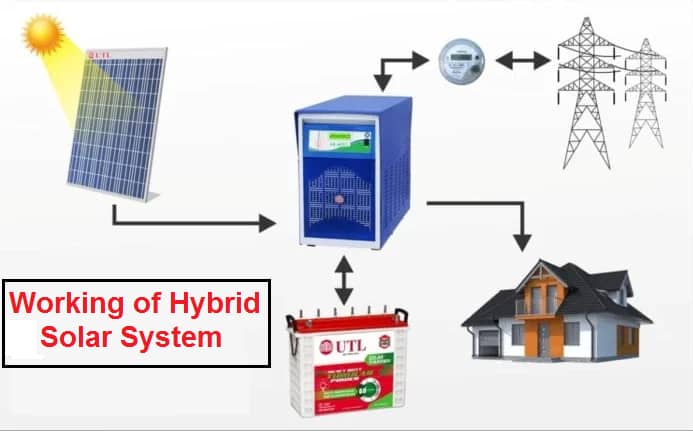
➡️ During the day, if the solar system’s output exceeds the electrical needs of your house, the excess energy is then stored in solar batteries and once the batteries are fully charged, the electricity is automatically exported to the utility grid via “Net-Metering.”
➡️ For night, you will have 2 options in the inverter grid and up to 50% batteries. If you choose govt power/grid, the grid will run your load and in case of power cut, solar batteries will power your home. If you choose the battery for second priority, the battery will be drawn up to 50%. In case, your household consumes more than 50% battery, the extra electricity required to power the house is drawn from the utility grid.
Your home’s power performance will be the same whether the electricity is being drawn from the solar panel, solar battery, or utility grid.
Let’s look at an example to better understand it. Assume your hybrid solar system generates 100 units in one day and you only use 55 units at home; the remaining 45 units will be stored in solar batteries, and if solar batteries are unable to store that much electricity, the excess will be sent to the utility grid via net-metering, resulting in savings on your electricity bills.
#3. What is Net-Metering?
Net metering is a process that analyzes and displays your grid’s exports and imports along with other figures, such as how much power is generated by the solar system, how much we have consumed, etc. While exporting, your electrical meter will spin backwards. And by the end of the month, your electricity bill will be calculated and adjusted using these parameters.
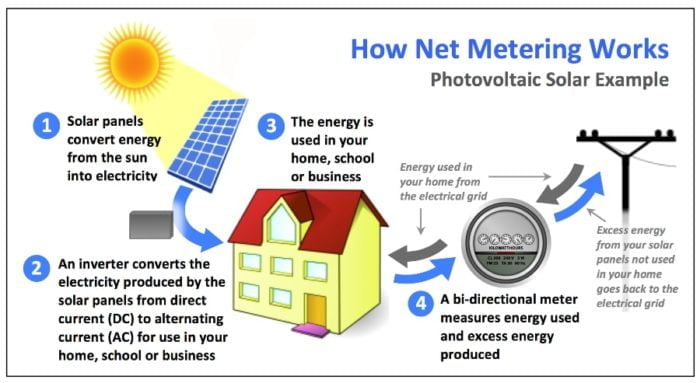
A bi-directional meter is used to perform all of these procedures. The total electrical consumption of a home will be tracked by this tracking meter. You can easily monitor how much of your home’s electricity needs are met by your system’s output and how well your system is performing at any given time.
Click to read more: How Solar Net-Metering Works?
#4. 5kW Solar Hybrid System
A 5kW hybrid system can generate up to 20 units per day and 600 units per month as an average. You will get all its accessories along with it. Detailed description regarding 5kW solar hybrid system is mentioned below.
5kW Solar System Price
- Free Electricity
- Power Backup
- Net Metering
- 25 Years Panel Warranty
- 5 Years Complete Warranty
- Increase Your Savings
Specifications of 5kW Hybrid System
| Particulars | Description |
| Solar System Capacity | 5kW |
| Solar Panel | 335 Watt |
| No. of Module | 15 Nos. |
| Type of Solar Panel | Mono/Poly |
| Efficiency | Up to 19% |
| Warranty | 25 Years |
| Solar Inverter | 5kVA |
| Inverter Type | Hybrid Solar Inverter |
| Technology | MPPT |
| Maximum DC Input | 5 kW |
| Voltage | 24V |
| Efficiency | 97% |
| Warranty | 5 Years |
| Solar Battery | 8 Nos. |
| Technology | Tall Tubular Solar Battery |
| Battery Type | C10 |
| Capacity | 150Ah |
| Voltage | 12V Each |
| Warranty | 5 Years |
| Other Accessories | Junction Box, AC/DC Cable, Fasteners, Cable Tie, Crimping Tool, Earthing Kit, Lighting Arrestor |
| Selling Price | Rs.3,83,990 (Inclusive of all taxes) |
Recommended Load And Power Backup with 5kW Hybrid Solar System
We have mentioned some load recommendations/combinations, as well as the battery backup, to give you an idea of what you can run on a 5kW hybrid solar system.
| Home Appliances | Load Capacity | Backup Time |
| 8 LED Lights + 2 Fan + 2 Ton AC + 1 Fridge | 4000 watt | 5 Hours |
| 12 LED Lights + 6 Fan + 2 Cooler + Fridge + 1 TV | 2500 watt | 8 Hours |
| 12 LEDs + 6 Fan + Fridge + Washing Machine + 1 Cooler | 2000 watt | 12 Hours |
#5. 10kW Solar Hybrid System
The average power generating capacity of 10kW solar hybrid system is 40 units per day and 1200 units per month. 10kW solar system is best to run heavy load. The specifications of 10kW hybrid solar system is given below.
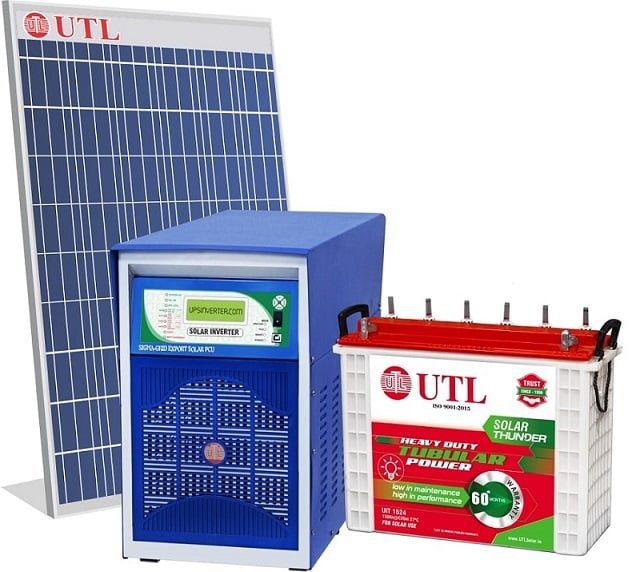
10kW Solar System Price
- Free Electricity
- Power Backup
- Net Metering
- 25 Years Panel Warranty
- 5 Years Complete Warranty
- Increase Your Savings
Specifications of 10kW Hybrid System
| Particulars | Description |
| Solar Panel | 400 Watt |
| No. of Module | 25 Nos. |
| Type of Solar Panel | Mono/Poly |
| Efficiency | Up to 19% |
| Warranty | 25 Years |
| Solar Inverter | 10kVA |
| Inverter Type | Hybrid Solar Inverter |
| Technology | MPPT |
| Maximum DC Input | 10 kW |
| Voltage | 120V |
| Efficiency | 97% |
| Warranty | 2 Years |
| Solar Battery | 10 Nos. |
| Technology | Tall Tubular Solar Battery |
| Battery Type | C10 |
| Capacity | 150Ah |
| Voltage | 12V |
| Warranty | 5 Years |
| Other Accessories | Junction Box, AC/DC Cable, Fasteners, Cable Tie, Crimping Tool, Earthing Kit, Lighting Arrestor |
| Selling Price | Rs. 7,05,226 (Inclusive of all taxes) |
Recommended Load And Power Backup with 10kW Hybrid Solar System
| Home Appliances | Load Capacity | Backup Time |
| 8 LED Lights + 8 Fan + 2 ton AC (2 nos) + Fridge+1 TV+ Washing Machine+1 Cooler | 8000 watt | 4 Hours |
| 12 LED Lights + 6 Fan + 1 ton AC (2 nos) + Cooler+ Fridge+ 1 TV | 6000 watt | 6 Hours |
| 12 LEDs + 10 Fan + Fridge+ 1 TV+ Washing Machine+1 Cooler | 3000 watt | 10 Hours |
Hybrid Solar System Installations In India
We have installed hundreds of hybrid solar systems throughout India. People’s lives have been made easier by these solar systems, which has not only solved their problems but also made them more comfortable. You too can live in world-class luxury by having solar panel installed in your home. Some of the solar systems we’ve installed are shown below.
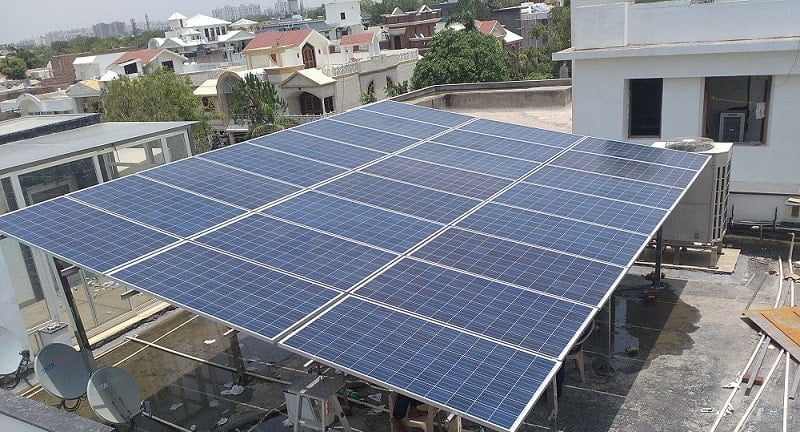
Hybrid Solar System Facts
- On average, a 1kW hybrid solar system generates 4 units/day.
- 4 units x 30 days = 120 units/month &,
- 120 units x 12 months = 1,440 units/year.
- There is 5 years straight warranty for the complete system and 25 years for the solar panel.
- Solar Net Metering also applies to a hybrid solar system.
- MNRE (Ministry of New & Renewable Energy) is providing 20% to 40% subsidy on solar for hybrid solar systems (without batteries) upto 10kW capacity.
You will get the delivery within 3 days from the date of order & installation within 3 days from the date of delivery.
#6. Subsidy on Hybrid Solar System
The government is providing subsidy on solar in order to promote solar power and propel India forward in the field of solar. You can also take advantage and install hybrid solar system (without batteries) on subsidy up to 10kW capacity. The subsidy rates are as follows:
- 1kW Solar System – 3kW Solar System = 40% Subsidy
- 4kW Solar System – 10kW Solar System = 20% Subsidy
These subsidy rates may differ depending on your state’s solar policy. For more information, contact your state’s nodal agency.
Continue reading: How to contact your state nodal agency & the complete procedure to get subsidy on solar.
#7. Pros and Cons of Hybrid Solar
Pros – Advantages
- Solar with battery backup of 8-10 hours as per use.
- Allow customer to go on grid with battery bank.
- This system works even when electricity grid is not available.
- Successful in areas where is no electricity or power cuts problem.
- Can run heavy electronics like AC, fridge, coolers etc.
- ROI in 5 – 7 years and life up to 25-30 years.
- Eligible for 20 – 40% government subsidy on solar.
Cons – Disadvantages
- Expensive – as additional battery cost is incurred to provide for a normal household or business functioning.
- Load Limitations – can not add more than the rated capacity of solar system.
Components in Hybrid System
#1. Solar Panel
Solar panels are the main component of any solar system. Solar panel absorb the sunlight and convert it into DC power. The quantity of solar panel depends upon the capacity of solar system. For example, in 5kW solar system 15 solar panel of 335 watt and in 10kW solar system 30 panel of 335 watt capacity is required.
Know more about: Solar Panel – Type, Brand, Price & Everything
#2. Hybrid Solar Inverter
A hybrid solar inverter is second major component in solar system. Solar inverter regulate the voltage that is passing into battery and your appliances. If needed it also converts DC voltage into AC voltage.
Learn more: Solar Inverter – Price, Types, Technology, Brand & A Complete Guide
#3. Solar Battery
Solar batteries provides you backup at the time when solar panels are not generating the power during rain or nights. Solar battery stores unconsumed power in it. In hybrid photovoltaic system, you can fix solar batteries as per you requirement.
Continue reading: Types, technologies and best price of solar batteries
Expert Advice
A hybrid solar system is an expensive solar system that provides you with luxury as well as uninterrupted power supply for your heavy appliances such as air conditioners, room heaters, washing machines, water pumps, and so on. So, if you want the luxury of uninterrupted power backup as well as the ability to export to the grid, we recommend this system.
Tips 1: If you believe you can’t generate enough extra solar power to export, you should consider an off-grid solar system.
Tips 2: If you want a quick return on investment, go with an on-grid solar system because the ROI is 3 to 5 years, where the same for hybrid solar system is 5 to 7 years.
Advice By: Hari Sharan (11 years experience in solar)
—Need a solar expert : Contact Us.
Read About Different Capacities Solar System
Frequently Asked Question
The price of 5kW solar hybrid system is Rs.3,83,990 which is equal to around Rs.76 per watt.
Solar net-metering is a system through which you can export excess power into the utility grid. During exportation of electricity, your meter run inversely which reduces your electricity bill.
In 5kW solar system 15 solar panels of 335 watt each is required.
The average generation of 5 KW solar system is 20 units/day and 600 units/month. For 10 KW solar hybrid system it is 40 units/day and 1200 units/month.
Hybrid PV system provides you the features of on grid solar system and off grid solar system. For providing backup, it has solar batteries and to resolve the problem of heavy electricity bills, it also have net-metering system in it.
In hybrid solar system, batteries are optional. For installing 5kW solar system 8 batteries and for installing 10kW system 10 batteries are required. Know more about: Solar battery.
The battery backup time depends upon the capacity of solar system and your load consumption. A 5 KW solar system can provide you 4 to 6 hours battery backup for 3500 watt load. Similarly, 10 KW solar system can provide you 4 to 6 hours battery backup for 7000 watt load.
If you are buying complete solar system at once than there is no need to buy solar accessories separately. You will get all its accessories along with the solar system. But if you are buying solar system piece by piece than you will have to buy GI channel, AC cable, DC cable, fasteners, cable tie, crimping tool, earthing kit, lighting arrestor, etc.
A 10kW solar system can run any of electric appliance like solar AC, fridge, TV, washing machine, cooler, etc. It can run up to 8000 watt load for approx. 4 hour.
In hybrid photovoltaic system you will get 5 year warranty for complete system and 25 years warranty for solar panel.
There is 40% subsidy on solar panel by government. But the subsidy rates may be vary according to your state solar department’s policy.
If you want to buy on grid solar system, off grid solar system or hybrid system for your home or business then you can contact us. You can buy it from our online solar store as well.

